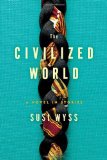
The Civilized World: A Novel in Stories
opens with a story of Adjoa, a Ghanaian woman living in Cote d’Ivoire with her twin brother. Adjoa visits the home of Janice, an American aid worker, to give her weekly massages. In some ways, this story is a set up of several of the stories that follow, and it serves to introduce a defining event in two of the main characters’ lives. Adjoa later returns to Ghana to open a beauty salon, her long-time dream. Called “The Precious Brother Salon,” it serves as a central point for several other tales.
This book is a collection of stories that are loosely intertwined, which is brilliant because you get different perspectives on certain characters. For example, in one account Comfort is visiting her Ghanaian son and his American wife, to help them with their newborn daughter. There’s a lovely anecdote of Comfort’s concern that her son didn’t write her about the terrible drought they’re obviously having that’s killed all the trees, and Peter and Linda assuring her that the trees always lose their leaves in winter and that in a few months they’ll be green again. Comfort does her absolute best to not be a meddling mother-in-law, and believes she succeeds. In another story later in the book, though, Linda makes an offhand comment about her terribly bossy mother-in-law. Told with humor, pathos, and observation, the tales are set in places as diverse as Malawi, Cote d’Ivoire, and the US, and told from a variety of perspectives.
Many books about Africa written by Westerners present it as The Dark Continent, a place where terrible things happen; great trauma, mystery and violence. It seems you can hardly read a short story set there without something heartbreaking happening. It’s true that The Civilized World: A Novel in Stories has some tough moments, but they are never the center of the story, rather they become a part of a certain individual’s experience. These are stories of everyday women living everyday lives, beautifully captured and preserved. Author Susi Wyss says, “Yes, famines exist, as do civil wars and AIDS. But people still live their lives, with the same joys and frustrations and desires all of us experience.”
The author herself grew up in Africa and has lived and worked there for 20 years as an adult, and I felt that in her writing. This book goes as far as any to prove that no matter our country of origin, we are all humans with the same needs and wants. When you’re reading it, you don’t think such lofty thoughts though—you simply enjoy some good story-telling.
I thoroughly enjoyed this book and highly recommend it!
Elizabeth lived in Africa for 9 years and counts many African women amongst her friends. Read her own thoughts on culture clash and travel at her blog Planet Nomad.